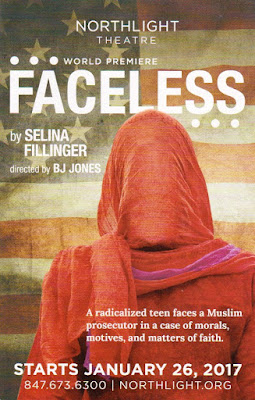Faceless
a world premiere play by Selina Fillinger
directed by BJ Jones
Northlight Theatre, Skokie, IL
Thru March 4
@@@@1/2
Given the considerable time it takes to research, write, refine, develop, schedule, produce and promote a play, it might seem rather kismet--from a topicality and publicity standpoint--that Selina Fillinger's Faceless, which focuses on Muslims in America and fears of terrorism, happens to be world premiering right now.
Certainly, anti-Muslim vitriol from certain quarters--and empathy for the predominantly peaceful followers of Islam from others--is nothing new, and in recent years I've seen three excellent plays by Rohina Malik (Unveiled, The Mecca Tales and Yasmina's Necklace) that have aided my cultural understanding rather acutely after terrorist acts have exacerbated American Islamophobia.
But with President Trump's immigration-restricting executive order that many, including me, read as a Muslim Ban resulting in great agitation and mass protest--and assuredly widespread support as well--Faceless comes at about the most salient juncture imaginable.
 |
| Photo credit on all: Michael Brosilow |
Particularly if the show opens eyes among audiences bringing with them varying perspectives.
Yet it's also a whole lot of imprecisely-added weight to put on what I believe is the first professional production of a play by Fillinger, who graduated from Northwestern just last June.
Though clearly quite talented--she twice won playwriting awards in NU's Agnes Nixon Festival and here demonstrates deftness with dialogue, pacing and balance--the author wasn't acutely writing about Trump, political polarization in America, refugees, Muslim bans or strategies for counteracting terrorism.
 Rather, Faceless more psychologically focuses on a 18-year-old, white, suburban Chicago girl named Susie Glenn (an excellent Lindsay Stock), who is on trial for attempting to join ISIS.
Rather, Faceless more psychologically focuses on a 18-year-old, white, suburban Chicago girl named Susie Glenn (an excellent Lindsay Stock), who is on trial for attempting to join ISIS.While this itself might sound pulled from headlines--and actually is, as Fillinger notes in the program that she was inspired to write the play upon learning that over 250 Americans have joined ISIS--the play proceeds, adroitly, in rather intriguing directions.
Though Susie's actions are never openly condoned, Fillinger paints this demonized girl with brush strokes we rarely consider, including her still being a child, dealing with the loss of her mother, feeling like a high school (and societal) outcast, longing for love and finding Twitter, Facebook, texting, etc., an easy way to interact internationally yet intimately with a man who expresses tenderness despite--initially unbeknownst to her--being a soldier with ISIS.
 Even her loving father (Joe Dempsey, who well handles a delicate role) and liberal, well-intentioned lawyer (longtime Chicagoland stage vet Ross Lehman, excellent but almost unrecognizable here) often demonstrate far less understanding of a struggling teenage girl than did Reza, the Syrian whose online conversations with Susie are depicted, though he isn't embodied onstage.
Even her loving father (Joe Dempsey, who well handles a delicate role) and liberal, well-intentioned lawyer (longtime Chicagoland stage vet Ross Lehman, excellent but almost unrecognizable here) often demonstrate far less understanding of a struggling teenage girl than did Reza, the Syrian whose online conversations with Susie are depicted, though he isn't embodied onstage.Counterbalancing Susie is a young prosecutor of Muslim descent, Claire Fathi (played by the terrific Susaan Jamshidi, who was also great in the title role of Yasmina's Necklace).
Raised in Chicago as the daughter of a French mother and Iranian father, Claire doesn't "use my faith to fight my battles; that's what ISIS does."
At least as the play opens, she is scornful of a "Wonder Bread white" girl who has maintained a 8-month communication with a "Jihadist," intended to move to Syria and marry him, posted pro-ISIS tweets, converted to Islam and wears a hijab.
 Somewhat goaded into heading Susie's prosecution by a much more seasoned--and calculating--Assistant DA, Scott Bader (Timothy Edward Kane, also quite good, like the entire cast), Claire intends to put Susie in prison for quite a long time, including for the career benefits doing so can have.
Somewhat goaded into heading Susie's prosecution by a much more seasoned--and calculating--Assistant DA, Scott Bader (Timothy Edward Kane, also quite good, like the entire cast), Claire intends to put Susie in prison for quite a long time, including for the career benefits doing so can have.But she is also skeptical about being used as a pawn because of her religion and appearance, and disdainful of Scott, who continues to make disparaging remarks about Muslims and women well past the point of it furthering the narrative.
I won't reveal any more of Faceless' specifics, including a court case that--sans the depth of legalese--begins to feel a bit like something a stellar episode of The Good Wife might have involved.
But as I was trying to intimate above, the 90-minute Faceless may be most skillful for what it isn't, at least not in preponderance. Sure, it's partly a courtroom thriller, partly a religious lesson, partly a look at prejudice and presumption, partly a discussion of Islam and intolerance, partly a character study of a young American who joins ISIS.
But to quote Selina Fillinger directly (from a marketing piece for Faceless):
"This play is first and foremost about two young women trying to face their fears, find their voices, and leave their marks."
And indeed, the beauty of Faceless is how it doesn't draw easy conclusions, engage in sound-byte polemics nor provide bumper sticker protest slogans. (Not that there aren't numerous pointed lines, such as "It's a privilege to defend the defenseless.")
Instead, it addresses the reality that we are all in this together, good and bad, with lines not always so clearly drawn, nor predictably obvious.
Though I saw just the first official public performance, it's easy to imagine Faceless being staged for years to come, at theaters around the world.
And without mistaking it for a pedestrian, hyper-topical dramatic crusade, the fresh, modern piece--along with much else, it makes ample use of emoticons--is gladly and yes, somewhat sadly, very much a play for our times.








0 Yorumlar